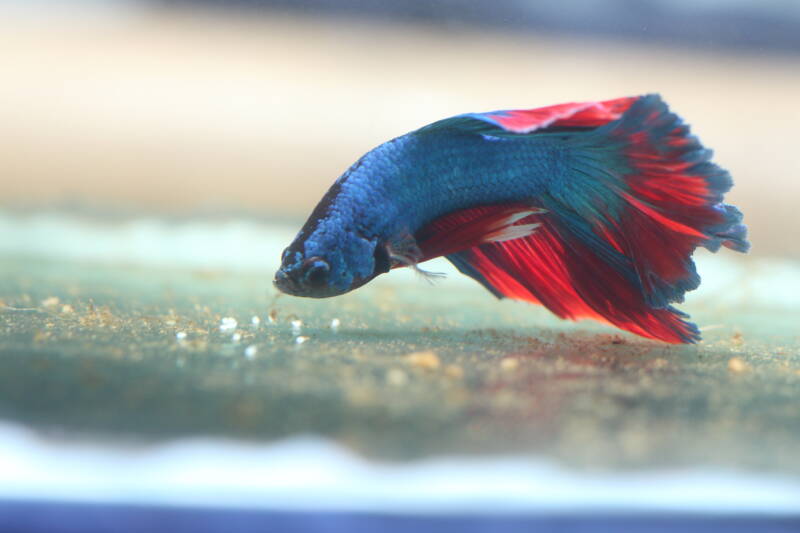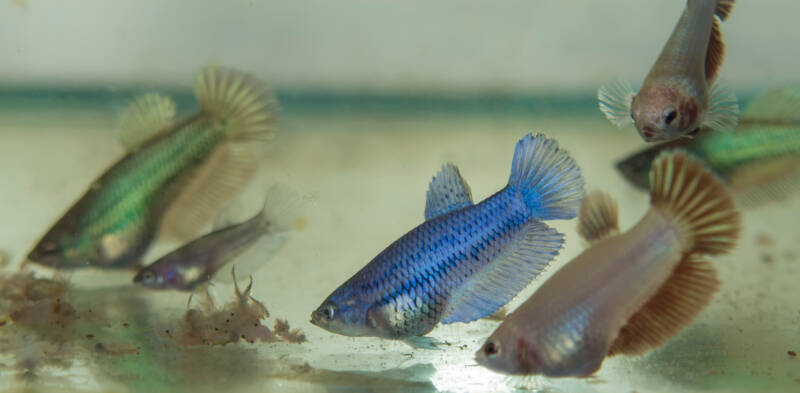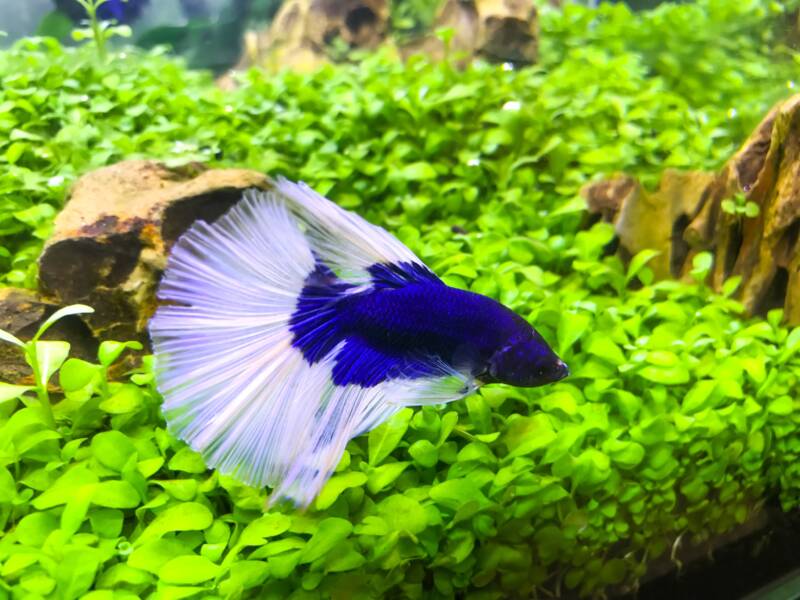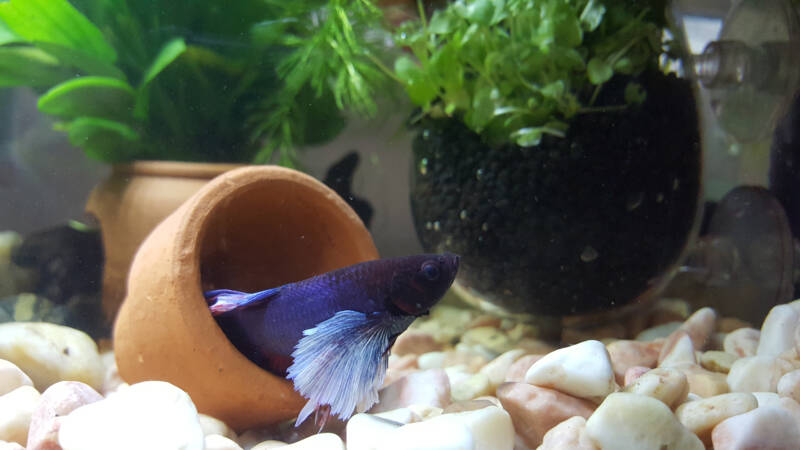Betta fish are home aquarium favorites. They are active, entertaining, quirky fish that are both beautiful and hardy.
These omnivores favor a meaty diet and are simple to feed; however, they can be prone to bouts of not eating. When this happens, it is not necessarily a cause for concern, but you should address it in a timely manner.
Keep reading for more information on possible causes for your betta’s lack of appetite and what to do.

[toc]
Why is my betta not eating?
Your betta can stop eating for several reasons, including the following common causes.
Water Quality
We have said it time and time again, water quality is one of the first things to check when your fish are not acting as they should.
Poor water quality or rapid shifts in water parameters result in elevated stress levels for your fish and a reduction in appetite.
Many aquarists keep their bettas in nano tanks, and the water quality in such a small system can change quickly.
Prolonged poor water quality increases the risk of infection and illness.
Temperature
Tropical fish, such as the betta, require warmer water temperatures to thrive.
Temperatures that are too cold slow down the betta’s metabolism and ability to pass food through its digestive tract.
As a result, this food becomes impacted, and your fish’s belly will swell.
pH and Ammonia
Bettas are sensitive to shifts in pH and ammonia levels in the water.
Leftover food can cause ammonia levels in the water to spike, creating an environment in which your betta is less likely to eat.
Filter Output
A filter that produces an excessive water flow can cause your slow-swimming betta to sit near the bottom of the tank and not feed as it normally would.
Old or Poor-Quality Food
If the food your betta happily enjoyed when you first started feeding it ends up suddenly untouched, it may be that your fish is refusing old, poor-quality food.
Yes, those flakes can go bad as moisture and heat contribute to mold growth. Always keep your fish food in an airtight container and away from heat or sunlight.
Food that has been sitting around for more than six months degrades due to the evaporation of water-soluble vitamins, including vitamin C, which your fish needs to boost its immune system.
Also, as the food goes stale, it loses some of its smell, and your fish will be less tempted to eat it.
Bloating
Your fish may lose their appetite due to bloating, which makes these normally hearty eaters feel full.
Take a close look at your fish’s belly. If it is unusually rounded and your fish is not eating, then they could be constipated.
This usually results from a combination of poor diet, overfeeding, or lack of exercise due to being kept in a small tank.
Stress
Fish that are under constant stress will be less likely to eat properly. For betta fish, stress levels rise when two males are kept in proximity.
Not limited to the males of the species, females can also squabble over resources, with one out-competing the other for food.
If your betta is new and not eating, they may be stressed from transport (if you had them shipped) or from the environment change between your local fish store and your tank.
Why is my betta fish not eating flakes?
Young or juvenile betta fish often do not recognize flakes as a food source, especially if they were raised eating only live or frozen foods.

Why is my betta fish not eating or moving?
Not eating is one thing, but not eating or moving may be a sign of illness.
Bettas are known to rest or sleep on the substrate but become active after a brief period or if you turn the lights on.
A sick fish will remain near the bottom of the tank for an extended period.
Learn the signs of disease and treat your fish as soon as possible. Some disorders are treatable at home, while others may require a visit to your veterinarian.
Swim Bladder Disease
If you often overfeed your fish, they could develop swim bladder disease.
In this case, the body of your fish will swell. As a result, they will not eat, will remain near the tank bottom, and they may even turn on their side.
Dropsy
Dropsy is caused by a bacterial infection and presents as a drastically distended belly. These bacteria are common in aquariums and are typically harmless.
However, if your fish is chronically stressed, then they can become infected.
Know the symptoms of dropsy, including a lack of appetite, curved spine, swollen belly, and a “pinecone” appearance of the scales.
How long can a betta go without eating?
In the wild, the incredibly hardy betta can survive up to 14 days without food.
Most bettas intended for sale to home aquariums are slightly less hardy. While they can go from five to 10 days without eating, this results in significant stress to their system.
These abilities to go without eating for extended periods assume an otherwise healthy fish and a lack of other stressors, such as poor water quality, an unbalanced diet, or poor-quality food.
After three or four days without eating, stress levels and aggression may increase for your betta.
What to do if your betta fish won’t eat?

Investigate the following potential issues in order.
Check the Water
If your betta fish is showing a reduction in appetite, first verify that the water temperature is within the betta’s range, which is between 78 to 82°F (25 to 27°C).
To prevent shifts in temperature, invest in an appropriately sized heater for your tank and a thermometer.
If you find that the temperature has dropped, raise it slowly so as not to further shock your fish. Similarly, do not raise the temperature above this range or keep the tank in a sunlit area where the temperature can swing.
Clean the tank and perform a water change.
Break out your test kit and check the pH and ammonia levels. The pH should be between 6.5 and 7.5, and ammonia levels should be 0 ppm.
If you find that these measurements exceed these parameters, slowly shift them back to “normal.” Any rapid shifts will further exacerbate your betta’s resistance to eating.
Always remove any food that your betta does not consume within 10 minutes to prevent ammonia spikes.
Check Your Fish Food
Next, assess your betta’s food.
Is the food old or expired?
If it is older than six months, throw it out and replace it with fresh food.
Have you switched foods recently?
When introducing a new food to your betta, give them at least a week to accept it.
Have a backup food you know they like so they do not go more than three or four days without eating.
Are you feeding your fish a variety of healthy foods?
If you feed your fish the same food all the time, then your fish may latch onto that as its preferred food source.
The best approach is to feed them various foods from the start.
A balanced diet of flake, pellet, live, and frozen food will not only ensure their optimal health, but if you cannot find a certain food type, your fish will readily accept others.
Assess Your Betta’s Environment

Is your fish in too small of a tank?
If your fish is in a tiny tank, stay on top of water conditions and conduct routine testing.
Otherwise, consider a five to 15-gallon tank with a sturdy filtration system where the water conditions will not fluctuate as quickly and your fish have space to swim.
Is your fish competing with its tank mates for resources?
Is it harassed by other fish? Either of these situations can cause your betta to stop eating.
In these cases, you may need to relocate your fish to encourage them to eat.
Is your fish new?
If so, give it some time to adjust to its new environment. Keep the lighting low for the first few days and feed your betta small amounts of food in the morning or evening.
Assess Your Betta’s Health
Your fish may not be eating due to illness. Know the signs of disease and begin treatment as quickly as possible.
If you suspect constipation, fast your fish for two to three days.
Once they are passing stool again, give them a diet heavy in mosquito larvae, brine shrimp, and even a blanched pea for a while before returning them to their regular diet.
The best way to prevent constipation is to feed your fish a varied, high-quality diet in lesser amounts twice a day.
Consider moving them to a larger tank as more swimming space and increased activity will help.
If you suspect swim bladder disease, fast your fish for a couple of days, then feed them a high fiber diet once every two days until the swelling goes down.
Good foods to feed during this time are blanched peas and bloodworms.
Thaw any frozen foods and pre-soak freeze-dried foods in water before feeding them to your fish, so the food does not expand in their digestive tract.
If you suspect dropsy, this condition is treatable if detected early.
Move your fish to a quarantine tank, feed them high-quality foods, and treat the infection with antibiotic medication.
However, it can be difficult to spot the disease early, and as it progresses, it is often fatal.
How to get my betta fish to eat?
If you have ruled out all the issues listed above and your betta is still not accepting food, they may simply be a picky eater. It is not unheard of for a betta to refuse to eat one food or another!
Try a variety of foods to see what your fish prefers.
Start with live, freeze-dried, or frozen foods, such as daphnia, brine shrimp, or bloodworms, then move on to betta pellets or flake foods.
Give it some time for your betta to adjust to any new foods. Keep on hand foods they will readily consume so they do not go more than four days without eating.
Closing Thoughts
While not always cause for immediate concern, you should nevertheless pay attention when you notice your betta is not eating.
A quick check and adjustment of water parameters will do the trick in most cases. In others, you may need to change up your fish’s diet or rearrange their living situation.
Finally, check your fish for signs of illness and treat them accordingly.
We hope you have found this article informative. Send us a message below if you have any questions, comments, or stories about your betta fish.
